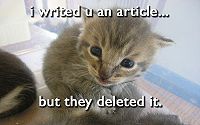User:Syed Kazim/CSD
| ||||||||||||||||||
 If you're reading this, it's probably because I tagged your page for speedy deletion while doing newpage patrol, it was subsequently deleted, and you came by my user page or talk page to leave me a message and ask why I deleted your page. First let me assure you that I was not, in fact, the one who sent your hard work to the digital dustbin--that honor belongs to the administrator who deleted it, and so if you're looking to have it restored you should talk to them (their name will be listed on the deletion log for the page, which should appear if you try to edit it). However, if you got a notice from me on your talk page, that means that I'm the one who tagged it for speedy deletion, and since you came here looking for answers I'll see if I can't help you out. | ||||||||||||||||||
| ||||||||||||||||||
|
There are four major reasons I would tag a new article for deletion: it is non-encyclopedic, it is a copyright violation, it is an advertisement or spam, or it is an attack page or other form of vandalism. Non-encyclopedic pagesThe most basic standard for inclusion in Wikipedia is notability--that is, whether or not the subject has received attention from the press. Wikipedia is not a place to establish one's notability, and so things like the band you started with your friends, the shop down the street that sells good donuts, or the awesomeness of your best friend don't belong in Wikipedia unless they've been written about elsewhere. If your subject has been written about elsewhere, you have to say why. Creating an article that just says "Paul is a really good cook" doesn't provide a starting point for other editors to build on. Who is Paul? What kind of food does he cook? Who says he's good? How do we find out more about him? Now, an article that says "Paul Prudhomme is a world-class cajun chef who hosts the show Paul Prudhomme's Always Cooking! on PBS"...that gives you something to sink your teeth into! And finally, articles which just can't become articles--articles with random text or no content (I'll generally give the latter about 5 to 10 minutes, and I suggest using the {{inuse}} template in the future)--get cleaned up here as well.
Copyright violationsSadly, all the notability in the world can't save a copyright violation. Wikipedia is a free encyclopedia, and as such we must use free content (with a couple of fair-use exceptions). If you copied most or all of your article from another website, chances are it's going to be deleted. After all, with a handful of exceptions that text is copyrighted by the website you took it from, and its unauthorized use can land Wikipedia in a heap of trouble. You can write an article using the website as a source--but pure copying is a big no-no.
Advertisements or spamWikipedia is not an advertising service, and the community is very sensitive to being treated as one. If you wrote an article that reads like advertising copy--if it extolls the virtues of your product, uses marketing terms like "dynamic" and "capable" to describe your company, boasts about how your website is the fastest growing ceramic-troll related forum on the internet--it's probably going to get deleted. Surprisingly enough, this includes companies you may not be associated with. An overenthusiastic analysis of a company by a genuine fan can be mistaken for something drafted by that company's marketing department (after all, it's not that difficult to fake). If this is the case, then I'm sorry your article was deleted but you simply need to tone it down next time.
Attack pages or other form of vandalismWriting an article saying "Becky is great" is one thing. Writing an article comparing her ass to a bowl of week-old clam chowder is another. Wikipedia does not tolerate personal attacks of any kind, be they against editors online or people you know offline. While it's only natural to want to blow off steam every now and then, Wikipedia is simply not your punching bag, and the same goes for pages created to vandalize or otherwise disrupt the project.
| ||||||||||||||||||
| ||||||||||||||||||
|
If you want your article back, you need to ask the deleting admin very nicely. They may or may not comply with your request, depending on the type of page that was deleted (i.e. a page deleted because notability was not established is much more likely to be restored than an attack page or pure copyright violation). If the administrator does not comply and you believe your article was deleted against procedure, you can list it for review at Wikipedia deletion review, although your time and energy would more likely be better spent writing a new and improved version. I hope this helped answer some of your questions. If you're still confused or want to leave a comment, feel free to leave me a message by clicking here. Be sure to sign your post with four tildes (~~~~) so I know who you are! | ||||||||||||||||||
